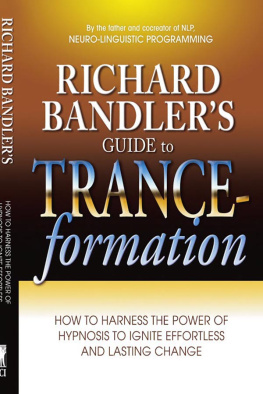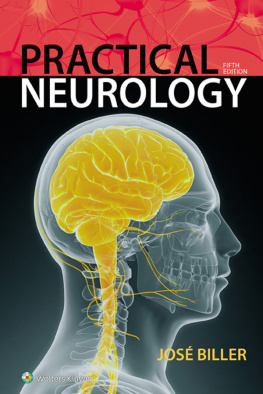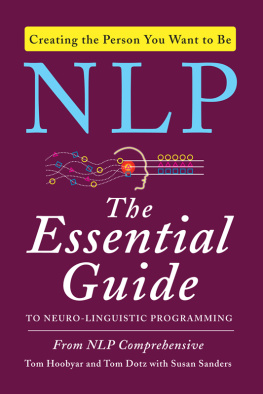Chapter One on propulsion systems (compulsion, fetishes, etc.) comes primarily from Richard Bandler (who else!) as does Chapters Two and Three on Trance with contributions from Don Wolfe.
In Chapter Four regarding linguistics and the Meta-Model, I used primarily the presentation of Eric Robbie, with the piece about Belief Change from Richard Bandler and the piece on Linguistic Markers from Chris Hall.
From Chris Hall, along with Dr. Max Steinbach, I took most of the materials in Chapter Five about the Sleight of Mouth patterns.
As far as I remember, credit goes to Wyatt Woodsmall for Chapter Six on Synesthesia, although Eric Robbie claims it as his. From Wyatt I put together Chapter Seven regarding Submodalities although I wrote most of it from the presentations of Eric Robbie.
The materials on Strategies came from several different presentations : Tad James addressed the subjects of Elicitation and Structure, Bob Klaus addressed the Strategy of Excellence, Wyatt Woodsmall presented the NLP pie of E.B. (External Behavior), I.S. (Internal State), and I.P. (Internal Processing), and both Bandler and Robbie presented the section on Modeling and Momentarily Becoming Someone Else.
Over the years, I have focused on states of consciousness and so derived Chapter Nine from Richard Bandler, Tad James, and Wyatt Woodsmall. The collection of information about Meta-Programs came in part from Chris Hall, Eric Robbie, Wyatt Woodsmall, Bob Klaus, and myself.
Regarding the Kinesthetic Time Line, credit for this goes to Will McDonald, who has passed from this life. To the best of my ability I have sought to give credit for the material to the trainer as my memory and notes have indicated.
The Meaning, Process, and Criteria for Mastering NLP
NLP is an attitude, backed by a methodology that leaves behind a trail of techniques.
Richard Bandler
What truly is the very spirit of NLP? What distinguishes a Practitioner of this art of modeling excellence from a Master Practitioner? Wherein lie the distinctive meanings and criteria involved in mastering the NLP model? What process enables us to master it?
I wrote the following, based first upon my own Master Practitioner Training and Trainers Training with Richard Bandler. To this I have also added (or contaminated, as the case may be) my own experiences and readings over the years with regard to the field of NLP, first as a psychotherapist and then as a trainer. I have done so in order to answer these initial questions.
Years have now passed since my original training with Richard Bandler, and yet my initial appreciation of Richard, who began this field with what I have here designated as The Spirit of NLP, has grown. I speak now of that playful, curious, outrageous, and passionate attitude that both he and John Grinder brought to, and learned from, the original three therapeutic wizards (Fritz Perls, Virginia Satir, and Milton Erickson).
As I got to know Richard through the trainings and then worked with him to edit and produce various materials, I became aware of his role as the creative genius behind NLP. Many do not seem to see this or recognize his genius. Perhaps they are disconcerted or offended by the rough exterior that he presents. And he certainly can offend when he wants to! Yet beneath it, especially when he and John began their journey, he has a spirit of passion in going for it and a curiosity for all things possible. This very spirit functions, foundationally, to endow NLP today with a quality of the dramatic and the dynamic.
The NLP paradigm, as a communication and behavioral model, arose in part when the men and women who later became the cofounders and developers of NLP began to translate Bandler. Even John Grinder became involved for this very reason. Apparently he found in the young brash kid at the university someone who had an incredible natural ability to imitate the voice, tonality, and patterns of Perls and Satir after listening to them on audiotape. John wanted to learn that genius. And Richard also wanted to learn how he did it. So, with Richards gift and Johns genius for pulling something apart linguistically, NLP was born.
Bandler and Grinder originally set out to model Virginia Satir, Fritz Perls, and Milton Erickson. And yet as they did, they became aware of Richards genius in unconsciously imitating the experts with astonishing ease and speed. Even surprising himself with his ability at modeling of Perls and Satir, he and John set out to pull apart the component pieces in terms of neurology and language in order to understand how this magic worked and how they could enable others to access the same excellence.
Richard Bandlers spirit, then, with his wild and wonderful ideas, his gruff style, and his unpredictable curiosity lies at the heart of this revolutionary technology for human resourcefulness. In this perspective, NLP reflects and represents his genius of modeling.
I first realized this by reading all of the classic seminar books edited by Steve and Connirae Andreas. From those works, I decided to begin my own NLP training with Richard Bandler. Later, in 1989, during a Master Practitioner training in San Diego, I took extensive notes. I later published these with the approval of NLP Products and Promotions for the participants.
In 1990, Richard asked me to create another set of notes, this time for his Trainers Training. After that adventure, Richard asked me to transcribe his work with Applied Neuro Dynamics, given during a London Seminar, as well as a training in hypnosis. I transcribed and edited the materials that later became the basis for the book, Time for A Change. Simultaneously, Richard was wanting to revive the Society of NLP. So I worked with him with regard to producing a directory that would describe the Society, present articles of contemporary and cutting-edge aspects of NLP, and make a complete listing of all the members. In spite of four months work on that project however, it never saw the light of day.
In the years since, I have not only continued to use and develop NLP as part of my psychotherapeutic practice as a cognitive psychologist , but I have conducted numerous NLP Practitioner and Master Practitioner trainings. More recently, I researched and published articles (in Anchor Point and NLP World) regarding the historical roots of NLP in the works of Alfred Korzybski and Gregory Bateson. I also wrote a series on The Almost Inventors of NLP. For my doctorate in cognitive psychology, I created an integration of NLP with several other models (i.e. Reality Therapy, Adlerian, Frankls Logotherapy, Ellis REBT, etc). (See Languaging, 1996).
The Spirit of NLP currently extends and expands the notes that I originally made. I have reformatted the text to focus primarily on conveying the spirit of NLP. At the same time, I think that it does offer, to a large degree, a tribute to the genius, attitude, and passion of Richard Bandler as one of the co-founders of this domain.
I believe that identifying that spirit, specifying its components and discovering its strategy, offers a significant contribution to the ongoing development of NLP. Wouldnt you like to have the strategy that Richard used (along with John) in coming up with NLP in the first place?

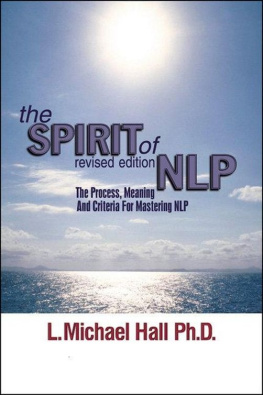
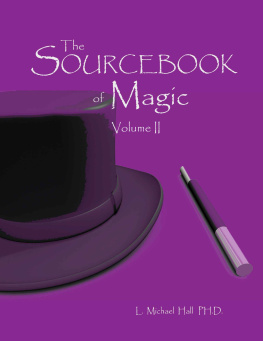

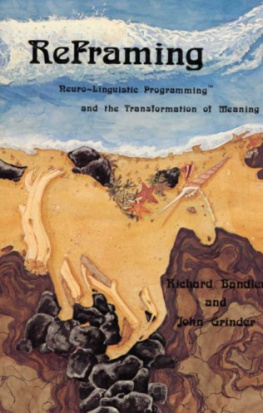
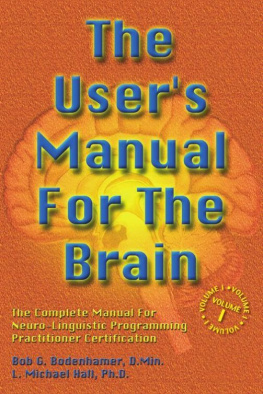
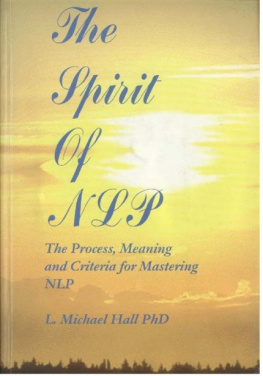
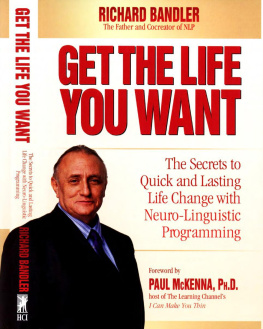
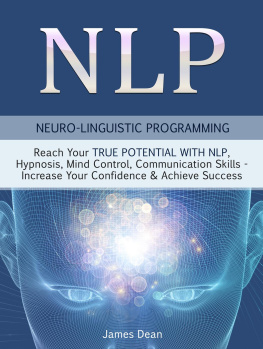
![Yakov Fain [Yakov Fain] - Java Programming 24-Hour Trainer, 2nd Edition](/uploads/posts/book/119348/thumbs/yakov-fain-yakov-fain-java-programming-24-hour.jpg)
